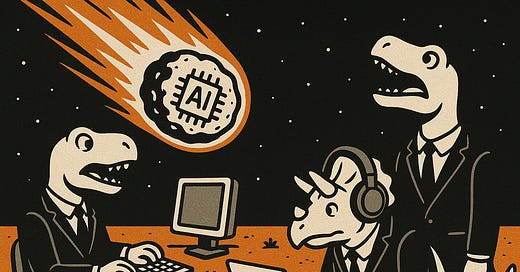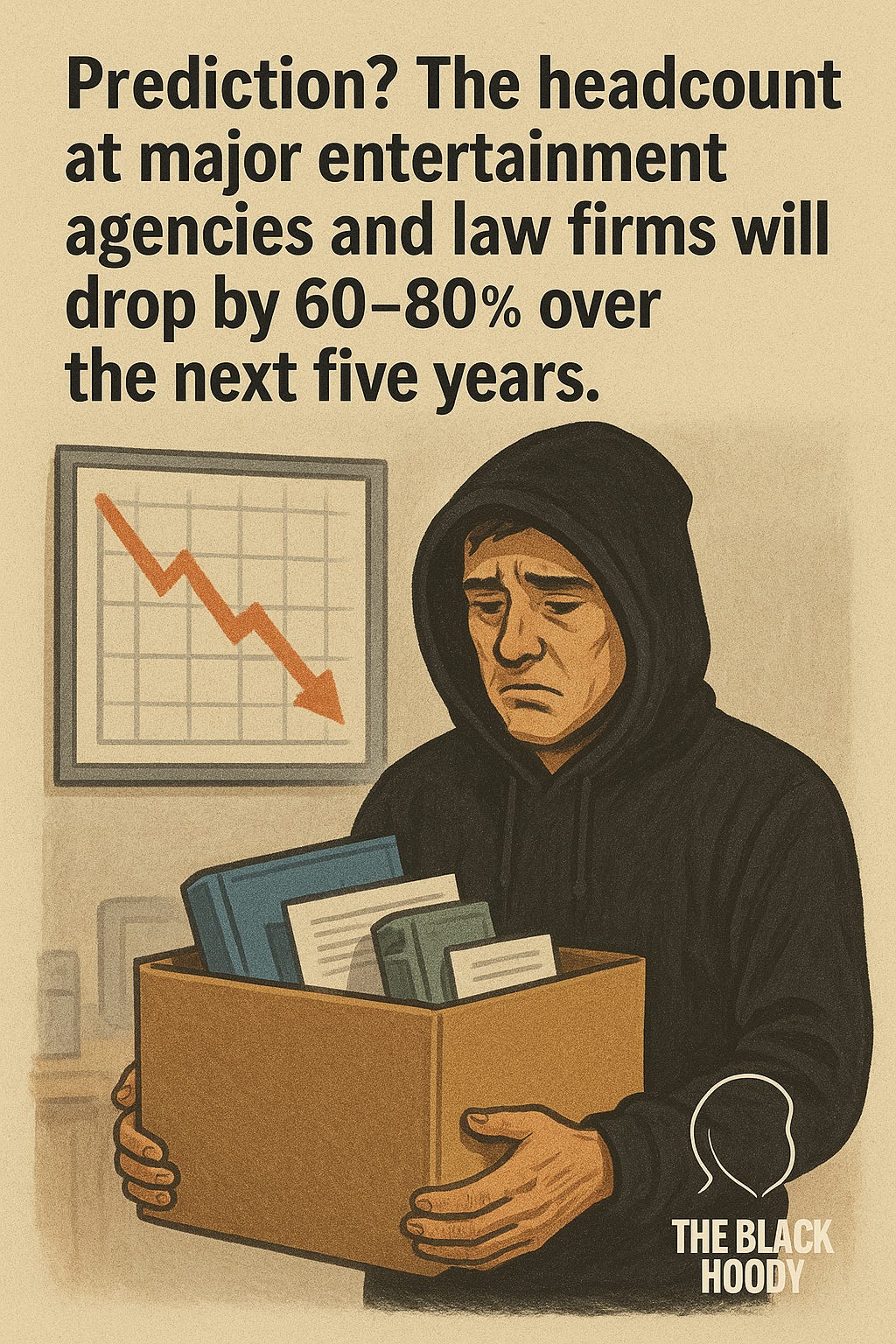The entertainment jobs AI will kill
Agents, lawyers, social media managers, PR, label managers. It’s a blood bath.
The AI asteroid has hit the entertainment industry, and the dinosaurs don't even know they're extinct yet.
"All the value is about to go to the thinkers... AI will take away a lot of the jobs that … (build) a fucking excel sheet." Gary Vaynerchuk
Since 2012, I’ve managed artists and ran various businesses. I’ve witnessed first-hand how technology, namely the internet, actually increased jobs in the entertainment industry with Social Media Managers, Distribution Managers, Influencer Marketers, etc.
But what technology has given, it will take away. AI will be an extinction-level event for a lot of roles within the music and comedy industries.
The AI Endgame
If you're not making creative decisions in the business, if you're not the person with taste determining what gets made and how it gets made, you will likely lose your job.
In an ecommerce business I currently run, I've reduced the size of the marketing team by 60% over the last 3 months. Why? AI tools can execute simple tasks, build out plans (under voice directive), create basic imagery, draft promotional copy, and analyse campaign data more efficiently than a room full of mid-level marketers.
The members in the team who stayed got raises, their productivity has increased by 10x.
Taste + High Productivity = Survival. Everything else = roadkill.
The Operating System Jobs vs. The Creative Decision Jobs
When I look at the music and comedy industries, I see two distinct categories of work:
Operating System Jobs: Chasing assets and 3rd parties, data entry, administrative work, project management, booking travel, scheduling social media, buying ads, etc.
Creative Decision Jobs: A&R, creative direction, innovative marketing strategy, artist management etc.
If your job falls primarily into the first category I would be looking to upskill into a creative job ASAP.
According to a recent McKinsey report, approximately 60% of administrative tasks in creative industries could be automated or aided by AI. That's not speculative; that's based on AI capabilities that already exist today.
Jobs That Will Disappear
1. Junior Publicists and PR Coordinators
The stark reality is that AI can already write simple press releases, personalise emails, create media lists, and track campaign metrics. A good PR director with taste and relationships will remain valuable, but the army of juniors who used to handle the grunt work? Gone.
2. Social Media Managers (The Executors, Not The Strategists)
If your entire job is posting content, scheduling it, and doing basic community management, you're already being replaced. The person in your team who has all the creative social media ideas will be using AI to execute them, not you.
According to a 2024 Hubspot survey, 74% of social media professionals are already using AI tools to handle at least part of their workload, and we are only in the first innings.
3. Data Analysts
When I ran Rolling Stone Australia last year, I would often send a request to my head of data, who would take a day to send me back a report with some insights. If I had further questions, it would take a few more hours to get me what I needed.
Now, I don't have anyone who is a data analyst in my team. I upload all my raw data into the various AI platforms and get detailed analysis in minutes.
What used to require a team now requires a prompt.
Where We Win: Taste as the Ultimate Differentiator
The one thing AI cannot replicate is true taste. The ability to identify what's cool before it's cool. The intuition to understand what will resonate with an audience on a deeper level. The vision to see where culture is heading, not where it's been.
This is why top A&R executives will remain valuable, on the other hand the A&R who just looks at streaming and social trends to sign the next big thing is done for.
I’m certain that creative directors and artist managers with strategic and creative minds won't be replaced.
As a manager, I believe the most valuable thing I offer isn't scheduling or admin, it's the ability to see something in an artist that others can't yet see, and to build a strategy around that vision.
Lawyers & Agents
There's a key group worth examining: the negotiators who deal with artists' rights and IP. But the impact on them won't be uniform.
The top-tier lawyers and agents, those with deep industry relationships, proven track records, and strategic minds will likely become more valuable than ever. However, the mid-level and junior professionals in these fields are facing a serious threat.
Think about it: Why would an artist manager hire a junior lawyer at $400 an hour to draft and review a standard sync licensing agreement when they could use Claude or another AI tool to do the work for zero of the cost and instant action?
Why bring in a new booking agent with limited connections when an AI tool could identify optimal tour routing and even handle the initial venue outreach?
I'm already shifting to this with my own management company. See my tech stack here which I published in September last year.
However, the most elite negotiators will survive and thrive, the lawyer who can understand how to best influence deals, the agent who can piece together a complex global tour strategy with personal relationships and insight. But the rank-and-file professionals who handle routine contracts and bookings… They're toast.
According to an analysis by LawGeex, legal AI tools can already perform contract review tasks with 94% accuracy in 20% of the time. Humans doing the same test did it at 80% accuracy. The implications for the entertainment law field are obvious.
The Big Four & law firms are already using AI for contract management, citing “notable time savings” as per the Financial Times.
My prediction? The headcount at major entertainment agencies and law firms will drop by 60-80% over the next five years. But, those who remain, the elite negotiators with genuine strategic value will likely earn more than ever before, as firms eliminate junior roles and invest more in their true experts and innovators.
What This Means For Your Career
If you're early in your career in music or comedy know that technical skills alone won't make you valuable. Building taste and developing your creative judgment is now more important than ever.
Some concrete steps:
Develop opinions and the ability to articulate why something works (or doesn't): Can you explain why a particular album resonates while a similar one falls flat? Can you identify what makes a comedy special memorable versus forgettable?
Look for roles that involve creative decision-making: Even if it means taking a pay cut or a more junior title, positioning yourself in jobs where you make creative or strategic calls will future-proof your career.
Embrace AI as a tool, not a threat: The most successful creative professionals will be those who use AI to handle the mundane so they can focus on the creative.
A More Creative Industry?
If AI can handle the operating system of the industry, and the only people left are the creatives who can run their businesses cheaper and more efficiently, it will allow more energy and resources to be poured into art.
The music and comedy companies that thrive will be those that use AI to cut costs on administration and reinvest those savings into creative development, into finding and nurturing unique voices.
The Human Touch: Why Some Roles Are Safe
There's a critical category of jobs that will remain solidly human: those that interface directly with artists.
Tour managers, personal assistants, on-site production crews, and others who provide direct, in-person support to artists aren't going anywhere. The personal touch, understanding a talent's mood before a show, knowing exactly how they take their coffee, providing emotional support during a grueling tour… these human elements can't be replicated by AI.
The Bottom Line
The future of music and comedy belongs to those with taste and strategy.
If you're just taking meetings, entering data, sending emails, or booking travel, start evolving your role now.
When I look at my roster of companies and talent, I've already successfully acted on this shift with incredible results. I now only hire and promote people with taste and vision or who can utilise AI tools to 10x their productivity.
If you take just one thing from this piece, hear this: those in the creative industry who aren't creative and aren’t productive will be out of a job, surprise surprise.








Hi Luke, I couldn't disagree more with this idea that creatives with taste are safe from AI. What we've actually seen from all the major AI tools in practice is the exact opposite. They take the creative roles and leave the boring mundane tasks to the humans. It's now AI tools that are generating the artworks from text prompts, it's AI tools that are generating spec scripts for movies and TV, it's AI tools that are re-writing or 'tightening' scripts on set, it's AI tools that are writing articles and novels and poetry and lyrics, it's AI tools that are creating royalty-free music for advertising beds and background audio for YouTube videos, it's AI tools that are creating game assets and scenes etc. etc. The people left are those writing the emails, making the phone calls, creating the spreadsheets - those doing the people-powered peripheral meatwork.
Unfortunately, the truth is that art created by machines is already "good enough" and consumers don't give a shit about craftsmanship or taste as long as it vaguely resembles the style that they like, they'll vote with their wallet to get their free AI-slop that had zero human input because it's close enough to be indistinguishable from Nickelback or 5SOS or BLACKPINK or whatever.